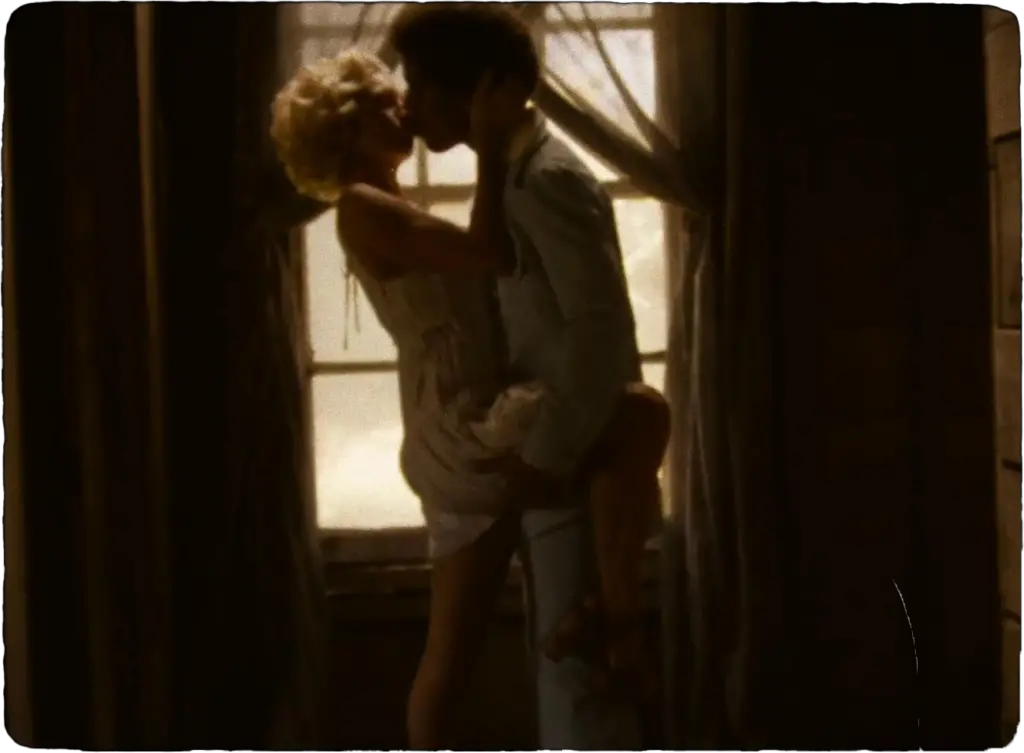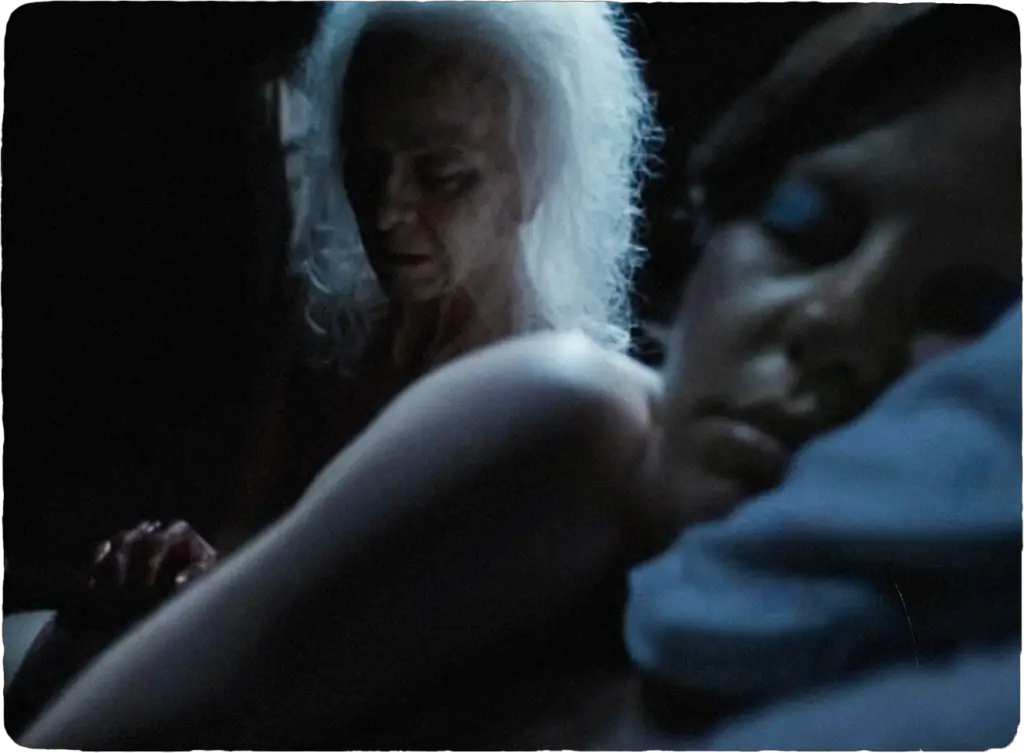* SPOILER ALERT * Slight spoilers for the movie ahead.
“X Marks the Return of the Slasher,” proclaims Fangoria. However, the slasher never died. These sweeping generalizations disregard an entire generation of modern-day filmmakers, carrying the DIY torch of the genre’s roots, to which X partially pays homage. Roots equal parts blood-soaked with progressive sociopolitical themes and defiantly politically incorrect. These roots grew deepest in the American psyche during the ’70s, when films like Last House on the Left, Texas Chainsaw Massacre, and Halloween encapsulated America’s ideological duality ― a duality that would rear its ugly head in 1979, when X is strategically set.
Films like Last House on the Left, Texas Chainsaw Massacre, and Halloween encapsulated America’s ideological duality
It takes place in an extremely conservative part of Texas, where traditional American values are cherished on the surface, and human desires fester as they remain hidden underneath. 1979 was the most pivotal sociopolitical shift in the American cultural landscape, domestic and foreign, since the 1950s. Everything changed. America’s duality was no longer a hush conversation ― The U.S. began rooting out every liberal movement that focused on the advancement of women’s rights and social progress for minorities simply to curb communism and keep capitalism as the western hegemony, all while promoting these same, liberal ideals at home ― as long as they remained under a capitalist regime. Like X, and the movie within it, 1979 was a giant 180-degree flip for domestic and foreign policy. It also marked a massive cultural shift that reverberated in the coming decades.
Rooting Out The Left
Throughout the film, the characters hear snippets of a pastor’s sermon echoing President Jimmy Carter’s Crisis of Confidence speech, criticized for being more of a sermon than anything remotely paralleling policy change. While Jimmy Carter waxed poetic in his Crisis of Confidence speech, America began to engage in wars and conflicts that didn’t align with the values of its citizens. Like the battle between conservative traditionalism and the younger, more overtly liberal, there was a growing collective movement on the left around the world during this time. Groups such as PLO, PFLP, ASALA, MSFIL, and the Sandinistas “threatened” the hegemonic status of America’s capitalist, imperialist, liberal at home, conservative abroad contrast. With the MSFIL holding the Iran hostage crisis and Iranian revolution, these left youths were upset that America funded and trained the far-right groups that curbed these organizations, and granted Shah Mohammad Reza (an oppressor and murderer of women) asylum in the U.S.

While the characters in X film their DIY porno inside, seemingly safe with their liberal mindsets, a similar oppressive force lurks outside. Consider the young filmmakers in X representative of the youthful left movements during 1979, and the elderly, murderous, conservative “sex fiends” ― as Mia Goth’s character, Maxine, refers to them ― representative of the older, repressive thought of generations prior, culminating into a simultaneous outburst on almost every continent in the form of mass causalities for the sake of western hegemony. The elderly conservative couple in X bottle up their desires and condemn the expression of the very same desires in the younger group. They violently get rid of the liberal filmmaking crew, very much reflective of America’s foreign policy.
Consider the young filmmakers in X representative of the youthful left movements during 1979
Meanwhile, the Pentagon’s funding of $800 million to more than 35,000 Afghan rebels abroad, beginning in 1979, in order to train them against Afghan communist forces, created the foundation for the Taliban and Al-Qaeda ― jihadists Jalaluddin Haqqani and Gulbuddin Hekmatyar (who would pour acid on women), members of Osama bin Laden’s close-knit circle, were two of the largest beneficiaries. The Afghan communists were even moderate liberals who wanted land reform, education, and, of course, women’s rights. But anytime the Pentagon sees “land reform” on a group’s political agenda, C.I.A.-backed death squads will be paying them a visit per the SAD division’s “Tertia Optio” motto.
Cue the other half of the Iran-Contra affair and the funding of the Contras to wipe out the Marxist Sandinistas. The C.I.A. famously used the profits of crack-cocaine to fund these death squads. Even at home, the U.S. couldn’t keep the light from shining through its surface’s poorly-maintained cracks. Leftism was becoming an identity for the youth after Vietnam awoke an entire generation to the horrors of the U.S.’s duplicity. No longer did we trust that “freedom” was a legitimate word. Or that our best interests were in mind. Or that we were the “good guys.” This distrust within the time period of 1979, along with the conservative-liberal clash, fuel the impetus of X’s conflicting ideologies between the youth and the elderly.
Carter’s Hypocrisy
While the U.S. curbed women’s progress abroad, Carter addressed a social movement at home in his Crisis of Confidence speech that contextualizes this contrast. One caused by America’s intervention in the various left uprisings across the world. Recession. Gas prices. Genocides. It’s all quite reflective of today. History repeats itself. And that is precisely why Ti West chooses this year. What have we learned? Only to topple left movements, fund Genocide, and curb women’s progress more covertly since our despotic “coming out” in 1979.
One person in Carter’s speech writes, “Mr. President, we are confronted with a moral and a spiritual crisis,” while a pastor writes, “No material shortage can touch important things like god’s love for us or our love for one another.”

The first notion encapsulates the premise of the film’s conflict. While the film itself brutally deconstructs the second notion when it takes a 180-degree turn in the form of the movie-within-the-movie. The pastor is a main motif throughout the film. Someone who condemns the rise of sexual freedom while his daughter stars in a porno. The rise of porn and the intersection of exploitation and liberation fuel the anger among the conservative right. Carter addresses the core characters of X’s “growing disrespect for government and for churches and for schools, the news media, and other institutions” through their DIY auto-didacticism, the purging of religion, and issues with authority.
Recession. Gas prices. Genocides. It’s all quite reflective of today.
How “our fathers and mothers…carved out a new charter of peace for the world,” yet caused the giant global collapse of 1979 and left little for subsequent generations. He warns that “down the path of self-interest lies the mistaken idea of freedom,” but the traditions of the past point to the restoration of American values. The greater good. The irony of this statement is that America itself was already on a crash course abroad in 1979 during that speech. One that was out of pure self-interest. A mistaken idea of freedom. Maintaining a hegemony while ensuring its citizens the foreign destruction was to protect their “freedom” at home. Our “values.” In reality, self-interest, the American Dream, and the romanticization of the individual at home are the very ideals instilled upon Americans since the country’s inception. While conservatism was forced upon our society once more, student protests and protesting as a political strategy became a thing of the past after 1979, until very recently, where BLM and other left movements have given rise to the power of protest again.
The Final Girl & The Youth’s Rebellion
Once again, X’s strategic setting comes into play. As always, freedom in the truest sense of the word wins. By the end of the film, the final girl, Maxine, isn’t a sober virgin, per traditional archaic slasher genre “rules,” she’s the star of the porno, and a character who’s been maintaining a coke addiction the entire film. She’s our heroine. And it’s important she’s flawed. She makes her own decisions free from government intervention, censorship, or men dictating her choices. “I will not accept a life I do not deserve.” She proclaims. At once it’s a symbol of her liberation, while also a damning snapshot of America’s silver spoon mentality that Carter was condemning. Alas, if one tells another person not to do something, they will likely do the opposite. Case in point ― the rise of the shopping mall and mass consumerism in the ’80s ― exactly what Carter warned about.

These rebellious youths of X saw the path of consumerism Carter tried to steer the U.S. away from in the 1980s. They saw a market for straight-to-video pornography, where people could watch porn in the privacy of their own abode, while the pastor throughout the film, Maxine’s father, complains about youths “bringing sex into good Christian homes right up our noses.”
“To the perverts.
To living a life of excess. To being young and having fun until the day we die.
To the power of independent cinema.
To living our lives on our own terms and never accepting what self-righteous naysayers have to say.”
These are the ideals of generation X, the last of whom were born in, you guessed it, 1979. The toast, right before the movie switches genres, encapsulates the ignorance, sexual liberation, and out-of-the-box thinking of these characters, as well as their disregard for the older generation. Cue Kid Cudi’s Jackson and Brittany Snow’s Bobby-Lynne’s beautiful “Landslide” cover played over a split-screen of the younger characters juxtaposed with the older, bitter characters, detesting their counterparts for living how they wanted to when they didn’t have the luxury. “You’re not innocent, you’re not special. You’re all we’ve taken from you.” Shouts the elderly woman, Pearl (also played by Mia Goth), to Maxine, finally exposed to the atrocities of the community around her. Just as the youth finally began to see the U.S.’s foreign policy for the death cult it really was, rebelling against the government’s conservatism abroad via both political parties, extending the counter-culture to heights.




